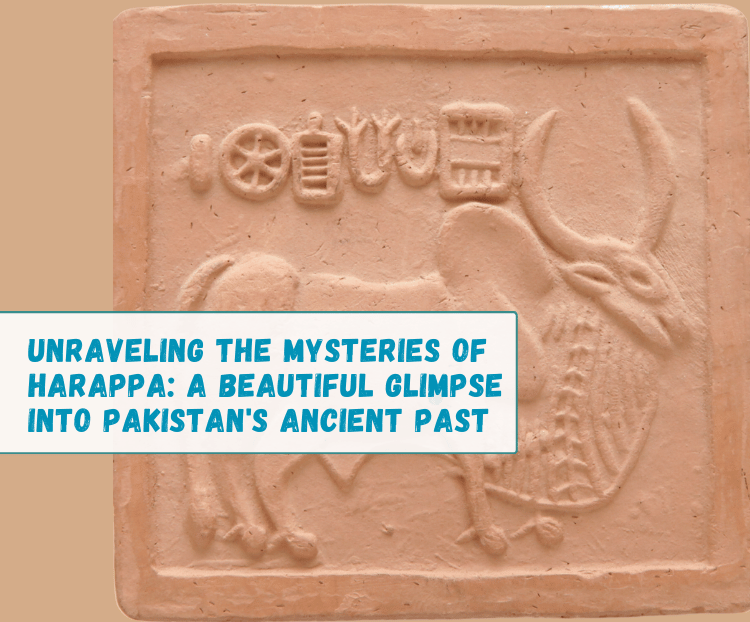Discover the rich history and archaeological wonders of Harappa, Pakistan. Explore the secrets of this ancient Indus civilization that thrived over 4,000 years ago. Learn about its culture, architecture, and the ongoing efforts to preserve its heritage.
Table of Contents



Introduction:
Harappa is located in Punjab, Pakistan, along the Ravi River. It lies in the fertile plains of the Indus Valley. In the annals of human history, few archaeological sites evoke as much curiosity and wonder as Harappa. Situated in modern-day Pakistan, It was once a thriving urban center of the Indus Valley Civilization, which dates back to around 2500 BCE. In this blog, we will delve into the rich history and archaeological treasures of Harapa, offering a glimpse into Pakistan’s ancient past
The Rich History of Harappa
It is one of the major cities of the Indus Valley Civilization, is believed to have existed between 2600 BCE and 1900 BCE. The site was discovered in the 1920s and has since provided invaluable insights into the life and culture of an ancient civilization that predates Mesopotamia and Egypt.
The civilization that thrived in Harappa was known for its advanced urban planning, sophisticated drainage systems, and a writing system that remains undeciphered to this day. The society was highly organized, and the city itself was spread over an area of around 370 acres, with massive walls protecting it from floods and external threats.
Archaeological Discoveries
Over the years, numerous archaeological excavations have unearthed a treasure trove of artifacts, providing a glimpse into the daily lives of the people who lived in the region. These discoveries include pottery, seals, jewelry, figurines, and even evidence of trade networks extending as far as Mesopotamia.
One of the most remarkable findings in Harappa is the Indus script, a written language that has yet to be fully deciphered. This script was used on seals and other inscriptions, suggesting a highly organized society with a system of record-keeping and trade.
Archaeologists have also uncovered a citadel and lower town at Harappa, shedding light on the urban planning and architecture of the Indus Valley Civilization. The city was divided into residential and commercial areas, with a grid-like street layout that showcased remarkable town planning skills.
Preservation Efforts
The Site has faced various challenges over the years, including environmental factors, urban expansion, and the encroachment of the Ravi River. To address these challenges, the Pakistani government and various organizations have launched preservation efforts.
The Harappa Archaeological Research Project (HARP) is one such initiative. HARP focuses on preserving and researching the archaeological heritage, seeking to expand our understanding of the ancient civilization through ongoing excavations and conservation efforts.



Tourism at Harappa
1Today, The site is open to tourists and history enthusiasts who wish to explore this ancient marvel. The Harappa Museum, located near the site, displays a collection of artifacts and provides visitors with an in-depth understanding of the civilization.
While visiting, tourists can wander through the ruins, walk the streets of the ancient city, and marvel at the remnants of a civilization that prospered millennia ago. It’s an opportunity to connect with history and gain a deeper appreciation for Pakistan’s rich cultural heritage.
Traveling to Harappa from Islamabad, you can opt for a scenic road trip that takes approximately 5-6 hours via the M2 motorway. Alternatively, fly from Islamabad International Airport to Lahore and then drive for about 2 hours to reach the site.
From Karachi, the most efficient way is to take a domestic flight to Lahore, which typically takes around 2 hours. After landing in Lahore, a 2-hour drive will get you to reach the site. This route provides the quickest access, allowing you to explore the historical marvels of Harappa from Karachi in a single day.
Request for Visitors to Harappa
Please respect the archaeological site, follow local regulations, and engage our knowledgeable guides. Stay hydrated, wear comfortable clothing, and be prepared for warm weather conditions. Enjoy the historical journey responsibly.
Conclusion
Harappa, Pakistan, stands as a testament to the indomitable spirit of human curiosity and exploration. The remnants of this ancient city offer a unique window into the past, showcasing an advanced civilization that has long fascinated archaeologists and history enthusiasts.


0 Comment